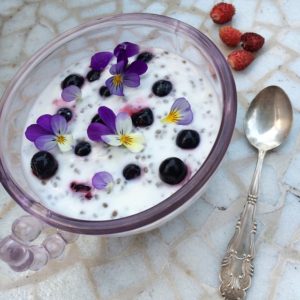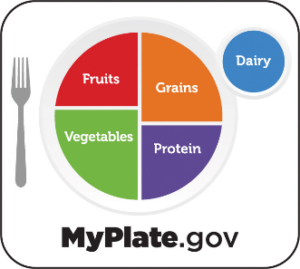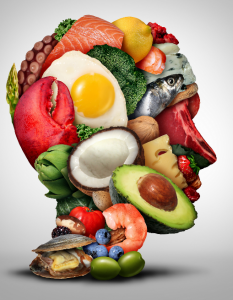 We all want to feel mentally sharp, energetic and ready to take on the day. Yet, we often feel sluggish with low energy, and this can affect our mood. So, what can we do? The good news is that food can play a huge role in changing the way we feel. Starting the day with protein, revving up our fruit and veggie intake, choosing balanced meals, and incorporating omeaga-3 fatty acids can make a huge impact on our physical and mental health.
We all want to feel mentally sharp, energetic and ready to take on the day. Yet, we often feel sluggish with low energy, and this can affect our mood. So, what can we do? The good news is that food can play a huge role in changing the way we feel. Starting the day with protein, revving up our fruit and veggie intake, choosing balanced meals, and incorporating omeaga-3 fatty acids can make a huge impact on our physical and mental health.
Start your morning right – add protein
- Protein in the morning balances blood sugar throughout day to provide sustained energy.
- A breakfast high in protein helps you feel full all day long. This decreases food cravings and unhealthy snacking that can leave you feeling sluggish.
- Foods high in protein help build your brain’s neurotransmitters like serotonin and dopamine. These neurotransmitters play a role in mood regulation, memory, pleasure, motivation, and attention.
Protein Sources
 Here are some good sources for protein that can be eaten any time of the day.
Here are some good sources for protein that can be eaten any time of the day.
- Eggs,
- Dairy products,
- Nuts/nut butter,
- Dried or canned beans,
- Meat, fish,and poultry
- Tofu, and tempeh
Get more – fruits and veggies for the win
 Everyone wants you to eat more fruits and vegetables, but how do they help with energy and mood?
Everyone wants you to eat more fruits and vegetables, but how do they help with energy and mood?
-
- Vitamins and minerals from fruits and vegetables are vital for brain health and energy metabolism.
- Fruits and veggies contain fiber. Adding fiber to meals regulates blood sugar to provide sustained energy throughout the day.
Fruit and Veggie Recommendations
Studies show, eating more fruits and veggies can improve mental health. Increased intake may improve feelings of well-being, enhance happiness, and decrease depressive symptoms.
- Consume at least 5 servings of fruits and/or vegetables each day.
- Eating the rainbow is always preferred! Variety of colors = variety of nutrients.
Balance your meals
 To keep your energy levels balanced throughout the day, include foods and beverages from each food group at mealtime. Food Groups to include whole fruits, vegetables, protein, whole grains/starchy vegetables, dairy/calcium
To keep your energy levels balanced throughout the day, include foods and beverages from each food group at mealtime. Food Groups to include whole fruits, vegetables, protein, whole grains/starchy vegetables, dairy/calcium
Try The Plate Method
Fill 1/2 your plate with fruits and veggies, ¼ with protein, and ¼ with grains/starches. With this method, you will consume a variety of key macro and micro-nutrients to help balance energy and moods.
Add bonus nutrients for brain health
 Omega-3 fatty acids are fabulous for the brain. Two components of omega-3’s called EPA and DHA are anti-inflammatory and support brain development and function. These fats are primarily found in fatty fish, seafood, and some algae. Studies show that consuming adequate amounts of DHA and EPA can reduce incidence of anger, anxiety, symptoms of depression, and cognitive decline in older age.
Omega-3 fatty acids are fabulous for the brain. Two components of omega-3’s called EPA and DHA are anti-inflammatory and support brain development and function. These fats are primarily found in fatty fish, seafood, and some algae. Studies show that consuming adequate amounts of DHA and EPA can reduce incidence of anger, anxiety, symptoms of depression, and cognitive decline in older age.
Omega 3 recommendations
The recommendation for fish consumption is 1-2 servings per week.
- Canned tuna is a great low-cost option.
- If you dislike fish, fish oil supplements are a good option.
- If you have a fish/shellfish allergy or are vegetarian, algae oil supplements are a good source of omega 3’s.
Try some of these mood and energy boosting tips and see how you feel!

